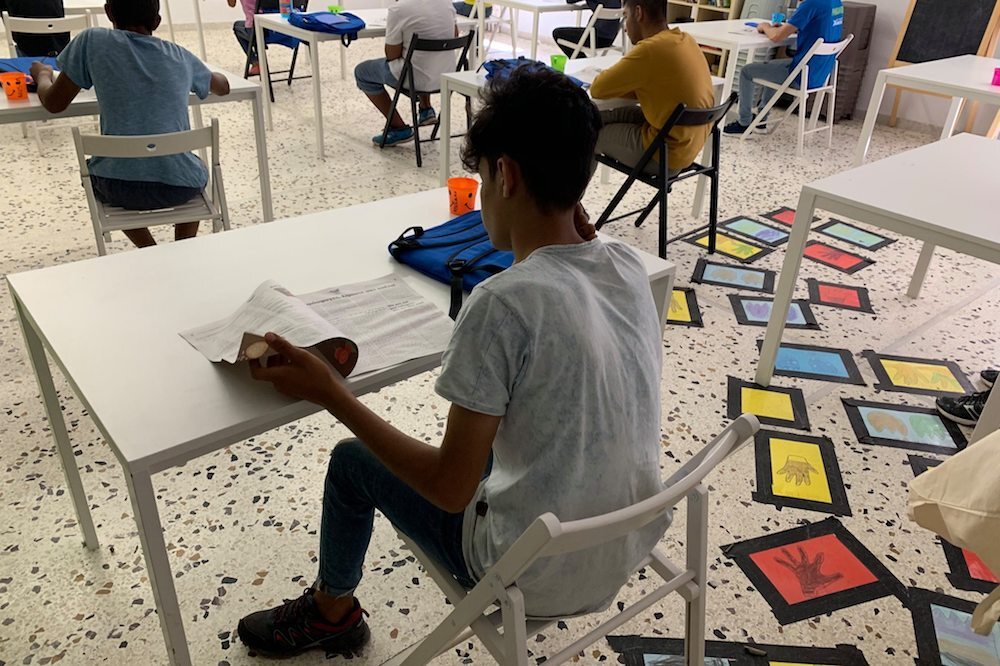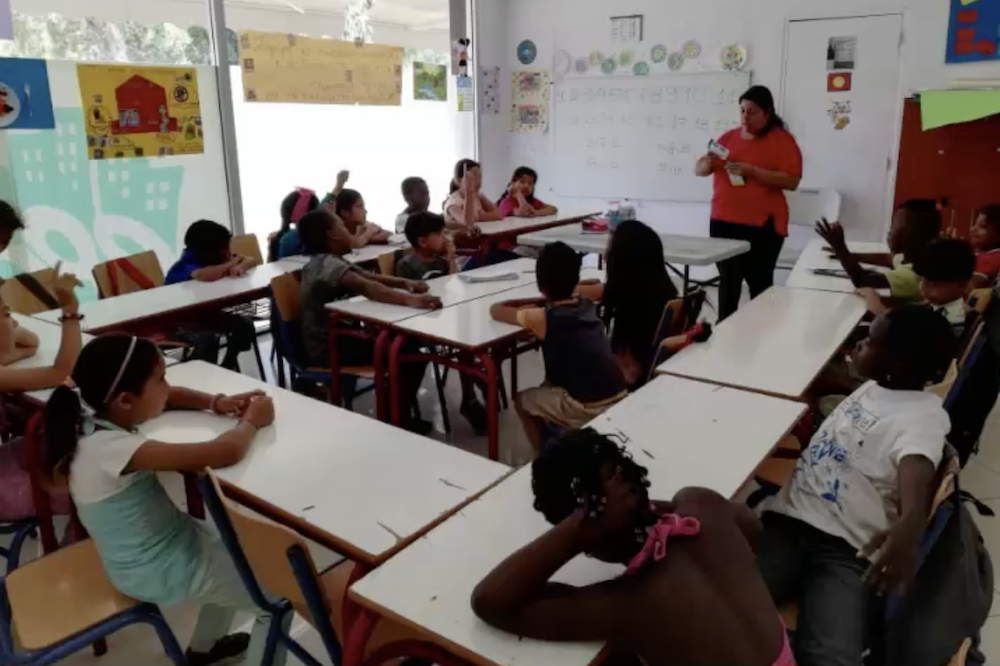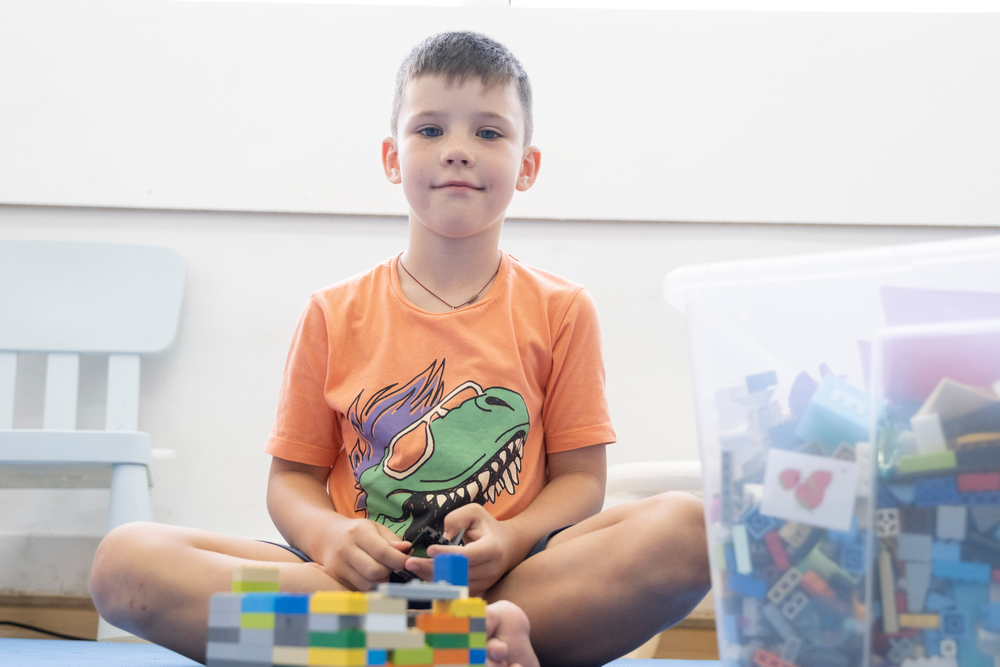
Refugee students happy to be back at school on Greek islands

Refugees and internally displaced people
Non-formal education centres for children and youth living in overcrowded camps had been closed since March because of the coronavirus pandemic.
Refugee children have returned to classrooms on the Greek Aegean Islands after weeks of school closures caused by the coronavirus pandemic.
Greece shut down the public school system in March, which meant non-formal education centres also had to call a halt to lessons. The centres are run by local organisations, many of them in partnership with the UN agencies UNHCR and UNICEF.
Most are outside the islands’ crowded refugee camps, which are home to more than 10,000 school-age children. So the school closures meant children were confined inside the camps for weeks.
Education continued to be delivered online, through apps and even with school work being passed to students at the camp entrances. But now they are happy to be back in their classrooms.
“Going to school was already a daily challenge for many refugee children on the Greek islands, whose lives have been disrupted first by displacement and harsh living conditions, and then a pandemic,” Jason Hepps, UNHCR Deputy Representative in Greece told Their News.

Students at the the LEDU education centre on Leros – before the shutdown caused by the pandemic (LEDU)
“Our non-formal education centres offered a welcome respite and learning opportunities for these children and we are now very glad that the operation of these programmes is resumed with activities adjusted to the COVID-19 context. Children were already very eager to return to the classroom, with their friends and teachers.”
The school system in Greece officially reopened at the beginning of June.
“There was an issue at first with the restriction of movement between the reception centres, where most of the children live, and the education centres,” explained Katerina Stavroula, Communications Associate for UNHCR in Greece.
“But now schools on the islands of Kos, Leros, Samos, Lesvos and Chios are open again and activities have resumed.”
Another boost came last week when Theirworld was awarded 1.35 million euros ($1.53 million) to fund emergency education for thousands of refugee children during the pandemic, in partnership with Education Cannot Wait.
The award from the Dutch Postcode Lottery (Nationale Postcode Loterij) will support UNHCR, UNICEF and partner organisations to provide vital education programmes for vulnerable children on the islands and on the mainland who have often fled war in countries such as Syria and Afghanistan. Without this donation, funding for education programmes for young refugees on the islands would have run out by the end of this month.
But 20 million euros is still needed to secure quality education for these children over the next two years.
Like all children returning to school around the world, the refugee students are having to get used to new Covid-19 safety precautions.
“We now have fewer students in the classroom. The children will be going in on different days in to keep the distance between them,” said Stavroula. “They are also being educated about health measures like washing their hands, as well as keeping their distancing while playing and in the classroom.”
The past few weeks have been especially difficult for many of the islands’ refugee children.
Xenia Chatzidavid, Local Co-ordinator of the KEDU education centre on Kos, said: “With the opening of the centre, I saw children looking to play games that we could not provide due to Covid and teenagers who had faced psychosocial problems created by isolation.
For children who have been displaced because of conflict or persecution, entering school restores their hope and dignity and opens a door to knowledge. Jason Hepps, UNHCR Deputy Representative in Greece
“We have drawings and stories by children whose lives were raw during the days out of school.”
KEDU is run by ARSIS (Association for the Social Support of Youth), a partner of UNHCR, the UN refugee agency. ARSIS works to prevent young people being marginalised by providing education, psychosocial support and preparation for employment. It also runs the LEDU education centre on Leros.
Chatzidavid said KEDU staff had worked hard during the shutdown to find simple and flexible ways of delivering education to the children.
“The students were supported in distance learning,” she said. “The days were difficult. The students did not even have the basics for their nutrition and health – not just wi-fi access, technological devices and parental support. However, a great effort was put in by the staff of KEDU.”
On the island of Chios, Melanie Liu – a teacher with Action for Education, a volunteer-run NGO that provides education and safe spaces on Chios and Samos – said: “We are open again and adhering to all the government requirements.
“We have implemented social distancing into our classrooms and outdoor areas, and all teachers and students are required to have their temperature checked and to sanitise their hands.”
Last week Their News paid tribute to teachers on the Greek islands to mark World Refugee Day. Read our report and see special videos below made by the teams at LEDU and KEDU.
More news

